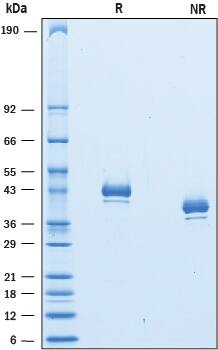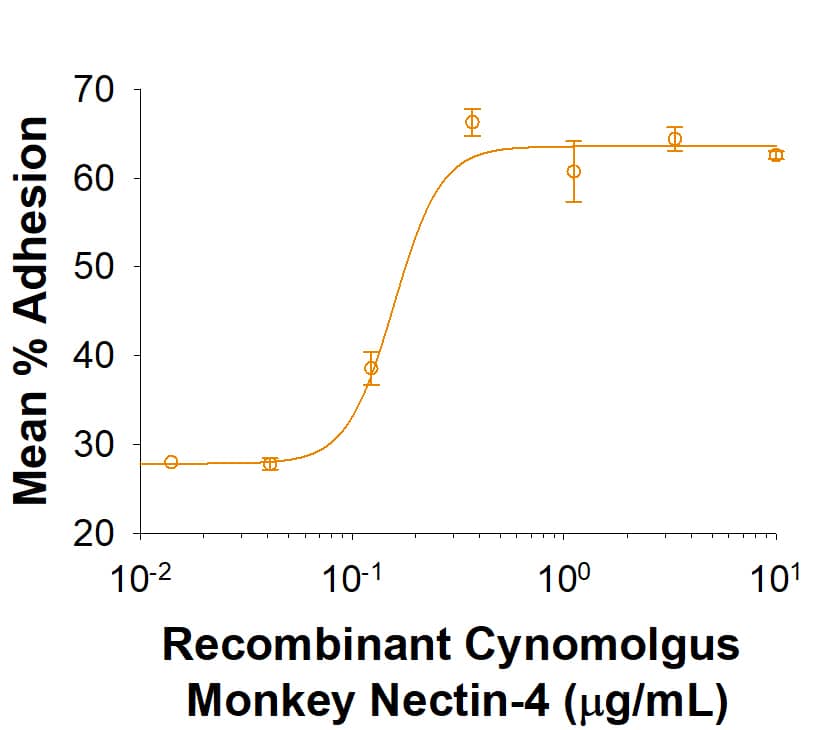Recombinant Cynomolgus/Rhesus Macaque Nectin-4 Protein, CF
R&D Systems, part of Bio-Techne | Catalog # 9996-N4
His-tag

Key Product Details
Product Specifications
Source
Human embryonic kidney cell, HEK293-derived Nectin-4 protein
Gly32-Ser349, with a C-terminal 6-His tag
Gly32-Ser349, with a C-terminal 6-His tag
Purity
>95%, by SDS-PAGE visualized with Silver Staining and quantitative densitometry by Coomassie® Blue Staining.
Endotoxin Level
<0.10 EU per 1 μg of the protein by the LAL method.
N-terminal Sequence Analysis
Gly32
Predicted Molecular Mass
35 kDa
SDS-PAGE
38-45 kDa, reducing conditions
Activity
Measured by the ability of the immobilized protein to support the adhesion of NIH-3T3 mouse embryonic fibroblast cells.
The ED50 for this effect is 0.1-1 μg/mL.
The ED50 for this effect is 0.1-1 μg/mL.
Reviewed Applications
Read 1 review rated 4 using 9996-N4 in the following applications:
Scientific Data Images for Recombinant Cynomolgus/Rhesus Macaque Nectin-4 Protein, CF
Recombinant Cynomolgus/Rhesus Macaque Nectin-4 Protein Bioactivity
Immobilized Recombinant Cynomolgus Monkey Nectin‑4 (Catalog # 9996-N4) supports the adhesion of NIH‑3T3 mouse embryonic fibroblast cells. The ED50 for this effect is 0.1-1 μg/mL.Recombinant Cynomolgus/Rhesus Macaque Nectin-4 Protein SDS-PAGE
2 μg/lane of Recombinant Cynomolgus Monkey Nectin‑4 was resolved with SDS-PAGE under reducing (R) and non-reducing (NR) conditions and visualized by Coomassie® Blue staining, showing bands at 38-45 kDa.Formulation, Preparation and Storage
9996-N4
| Formulation | Lyophilized from a 0.2 μm filtered solution in PBS. |
| Reconstitution | Reconstitute at 500 μg/mL in PBS. |
| Shipping | The product is shipped at ambient temperature. Upon receipt, store it immediately at the temperature recommended below. |
| Stability & Storage |
|
Background: Nectin-4
References
- Reymond, N. et al. (2001) J. Biol. Chem. 276:43205.
- Takai, Y. et al. (2008) Nat. Rev. Mol. Cell Biol. 9:603.
- Fabre, S. et al. (2002) J. Biol. Chem. 277:27006.
- Fabre-Lafay, S. et al. (2007) BMC Cancer 7:73.
- Takano, A. et al. (2009) Cancer Res. 69:6694.
- Fabre-Lafay, S. et al. (2005) J. Biol. Chem. 280:19543.
- Brancati, F. et al. (2010) Am. J. Hum. Genet. 87:265.
- M-Rabet, M. et al. (2017) Ann. Oncol. 28:769.
Long Name
Poliovirus Receptor Related 4
Alternate Names
LNIR, Nectin4, PRR4, PVRL4
Gene Symbol
NECTIN4
UniProt
Additional Nectin-4 Products
Product Documents for Recombinant Cynomolgus/Rhesus Macaque Nectin-4 Protein, CF
Product Specific Notices for Recombinant Cynomolgus/Rhesus Macaque Nectin-4 Protein, CF
For research use only
